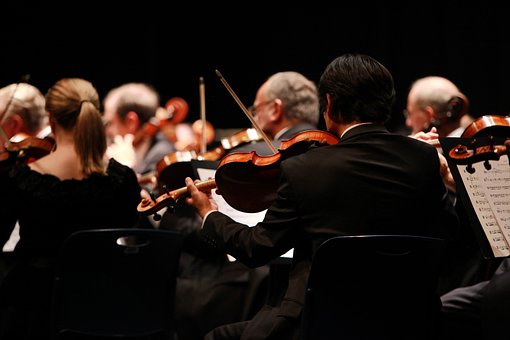10 November 2022
Levelling Down?
Arts Council Funding decisions.
By Lynda Goetz

I was brought up in the Home Counties and lived in London for nearly fifteen years. I left London some twenty-eight years ago, for thirteen of which I have been in Devon. Like many other rural dwellers, I still pay fairly regular visits to London to attend the theatre or to go to exhibitions. I am dismayed, as I suspect are many others, at the recent decision by the Arts Council to reduce or remove funding from several established London institutions in order to ‘redirect’ money to the provinces. This seems to be short-sighted in the extreme.
It is a well-known fact that London is a centre of excellence for the arts. Aspiring actors, singers, musicians and artists do not hope to achieve fame in Exeter, Birmingham or Cardiff. They know that London is where they need to be to progress their careers. They are, or should be, aware that this will almost certainly entail a period of straightened financial circumstances; possibly even a time of working two or three jobs (often unrelated to their career aspirations) in order to be able to make ends meet in the capital. Many will be unsuccessful, possibly abandoning their dreams altogether, a few will achieve the success and recognition they sought and the remainder may well retreat to other parts of the country to ply their trade in pubs, clubs, local theatres, libraries, schools and other venues. The organisations they set up or join may well meet a local need. They may well provide an introduction to theatre, music, books or concerts, but they are unlikely to attain the levels of excellence achieved by London theatres, orchestras, opera companies or exhibitions.
On an economic level, the Tory party has promised to address this imbalance and ‘level up’ the regions. Like many political promises, it is in many ways admirable. In reality, it is not easy to achieve without detracting from the capital, even though in July then PM Boris Johnson maintained it was a ‘win-win situation’ and they would not be ‘robbing Peter to pay Paul’. The Arts Council is attempting to do the same at the cultural level, under direction from Nadine Dorries while she was Culture Secretary. It has decided to, inter alia, completely remove funding from the English National Opera with its home at the Coliseum; to reduce by 50% the funding to Glyndebourne; to reduce the funds for the Welsh National Opera and Donmar Warehouse; to take monies away from two world-renowned orchestras, the Philharmonic and the London Symphony; to reduce the funds available to the Southbank Centre, the National Theatre and the English National Ballet. These decisions appear to be mind-bogglingly misguided. All these institutions have already instituted changes which result in provincial appearances. To remove the funds enabling them to do this and to dish them out to fringe organisations doing, for example, readings by drag artists in libraries, or dance companies collaborating with those who have been ‘othered’ by society, is going to damage a cultural heritage which has taken many decades to build up.
It is almost universally recognised that capital cities attract talent. Talent of all sorts, whether it be entrepreneurial, financial, legal or artistic is drawn to the centre of power and politics. London is not in any way unique in this regard. Why on earth do our establishment elites seek to undermine or even destroy these relationships? Encouragement to take this excellence to the provinces and shires is wonderful. Surely this is the way cultural ‘levelling up’ should be approached? Glyndebourne, about to lose 50% of its funding under current proposals for 2023-6, founded the Glyndebourne Tour in 1968 for ‘the dual purpose of providing a showcase for emerging artists and giving broader audiences a chance to experience world-class live opera, produced to the same exacting standards as our Festival operas’. Likewise, the Welsh National Opera, set up in 1943, has touring as a fundamental part of its ethos. It is to lose a third of its funding. The ENO has, rather dramatically, been informed it is to lose ALL its Arts Council funding and should consider moving to Manchester (although no-one appears able to explain why Manchester or where in that city it is supposed to create its new base with just 5 months to go). Opera in particular appears to have been singled out for a particularly harsh approach from the Arts Council. Is this because it is viewed as an art form associated with the white middle classes, with pale, stale, male elites or quite simply that the Arts council view it as out of touch with contemporary concerns? Some may, perhaps, with the help of private benefactors, be able to make up some of these lost funds. Opera companies like Wasfi Kani’s Grange Park get no public funding at all. Nevertheless, if we believe in excellence in the arts, rather than just ‘the arts’, we should surely not be punishing those institutions which have achieved excellence.
According to the Arts Council website, ‘This investment programme is fairer in its distribution, richer in its variety, and more widespread in its reach than ever before’. Clearly, theatres in Barnstaple and Ilfracombe (North Devon), amongst others, are delighted to receive this funding and it might be money well-spent, but is it enough to change the local mindset? Will theatre-going in the area increase or will audiences for the newest offerings remain limited? Perhaps provincial theatre will see a revival or an uplift as a result of the new funds, or perhaps all that will happen is that the cultural attraction of London will be diminished, foreign and provincial visitors will dwindle and jobs will be lost.
It is a widely recognised fact that artists of all sorts suffered a great deal during the pandemic. Social gatherings were not permitted, so the means by which most earnt their livelihoods could not take place. Most were not eligible for furlough payments or business grants because of the nature of their work and employment. A number showed great ingenuity in attempts to reach their audiences online, but overall, many suffered both financially and mentally. It does rather look as if this latest initiative might be one of those which, although decided with the best of intentions, produces a number of unintended but unfortunate consequences.
I am sure that at a time like this when money is tight, the decisions were not reached easily, or without a lot of discussion, but I know I am not alone in feeling that unfortunately this latest investment plan is very definitely ‘Robbing Peter to pay Paul’, that ‘Peter’ does not deserve to be robbed and that in the short term at least, perhaps even in the long term, these decisions will prove damaging to excellence in the arts in this country. I hope that I am proved wrong.


